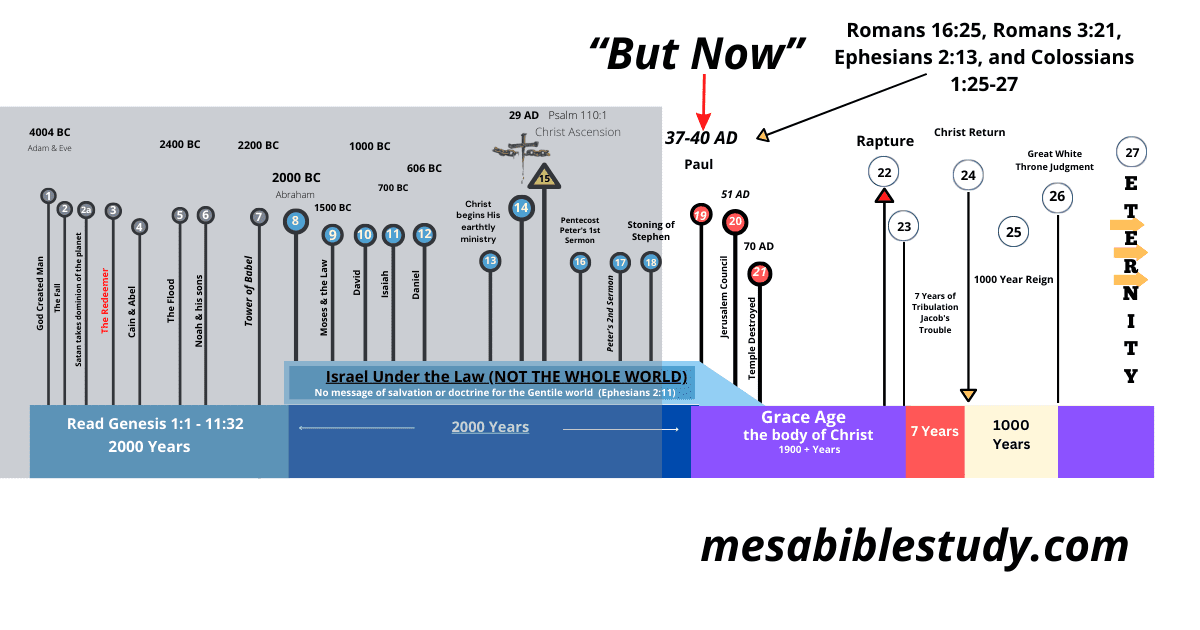Introduction
The Bible is a progressive revelation, unveiling God’s plan for humanity. In this progression, there is a moment that dramatically alters the course of human history. It’s a moment marked by two words: “But now.” These two words encapsulate a distinct progression in God’s redemptive plan, a shift that took place around 37 AD–40 AD. It’s crucial to understand the historical context and theological significance of this “But Now” moment.
The apostle Paul’s use of “But Now” in passages like Romans 16:25, Romans 3:21, Ephesians 2:13, and Colossians 1:25-27 serves as a pivotal time marker to signify a profound shift in God’s redemptive plan. It highlights a moment when God’s grace poured out upon all mankind, previously concealed, is now fully revealed, indicating a transition from what was known or practiced in the past to a new era of understanding and God’s plan for salvation. It signifies a move from the Law and Israel (temporarily) to grace and the body of Christ, emphasizing the significance of God’s grace, faith, and the finished work of Christ as the means of salvation for all mankind, both Jews and Gentiles.
The Historical Context
Before this pivotal moment, between 2000 BC and 40 AD, salvation was primarily reserved for the nation of Israel. The Old Testament and the Gospels reveal God’s dealings with the Jews only, His chosen people, with few exceptions for Gentiles (only nine Gentiles were saved). From the time of Abraham, God’s plan was to create a people for His name, the Jews, promising the coming of a Messiah who would rule from Jerusalem as Israel’s King. Meanwhile, the Gentile world had no such revelation.
The covenants with Abraham, Moses, and David laid the groundwork for God’s promises to Israel. The Gospels saw Jesus fulfilling Old Testament prophecies (Romans 15:8), but His rejection led to the crucifixion and a pivotal moment.
The “But Now” Moment
The “But Now” of Romans 16:25–26, Romans 3:21, Colossians 1:25-27, and Ephesians 2:13 began to unfold with Jesus’ crucifixion (as explained so beautifully in John 12:20–24). This moment marked the crescendo of Israel’s unbelief. After the rejection of Jesus, the nation faced Stephen’s stoning in Acts 7. God, in His sovereign plan, blinded Israel (Romans 11:25; Romans 11:32–33) to open the floodgates to all mankind, regardless of nationality or religious rituals. Salvation became a free gift (Romans 5:18) by grace through faith alone in Christ’s finished work.
The Revelation of the Mystery
The mystery of the gospel of grace revealed to the apostle Paul brought a major progression in God’s redemptive plan. This mystery, hidden in God, made salvation available to all, Jews and Gentiles, through faith alone. This clashed with the traditional orthodox Jews and their leadership (Pharisees and Sadducees) and the Jews of the Jerusalem Church like Peter, James, and John, who believed the gospel of the kingdom that Jesus was indeed the Christ (the promised Messiah) and the Son of God. Both groups fiercely clashed with Paul and the gospel of grace that now (“But Now”), Gentiles had access to Israel’s God without keeping the Mosaic law and temple worship. It was anathema to both groups!
The Judaizers tried to stamp out the apostle Paul’s grace message, and those from the Jerusalem church tried to undermine Paul’s gospel of grace by sending spies into Paul’s congregations, telling them they could not be saved unless they kept the law and were circumcised.
Implications and Conclusion
The “But Now” of Romans 16:25–26, Romans 3:21, Colossians 1:25-27, and Ephesians 2:13 represent a shift from a covenant-based, law-centric religious system to grace-centered faith-alone salvation. This moment still reverberates today, teaching us that we are not under the yoke of the law but under grace. Salvation is available to all, inviting people to come as they are (hell-bound sinners) and receive the free gift of salvation by faith in Christ’s finished work. The gospel message is clear: Christ died for our sins, was buried, and rose again, and we are saved by grace through faith alone (1 Corinthians 15:1-4).
In understanding this “But Now” moment, we gain insight into God’s incredible grace and wisdom, which offers salvation freely to all.
Recommended reading:
Peter vs. Paul: Conclusion: Paul tells Peter How Mankind will Be Saved Going Forward

0 Comments